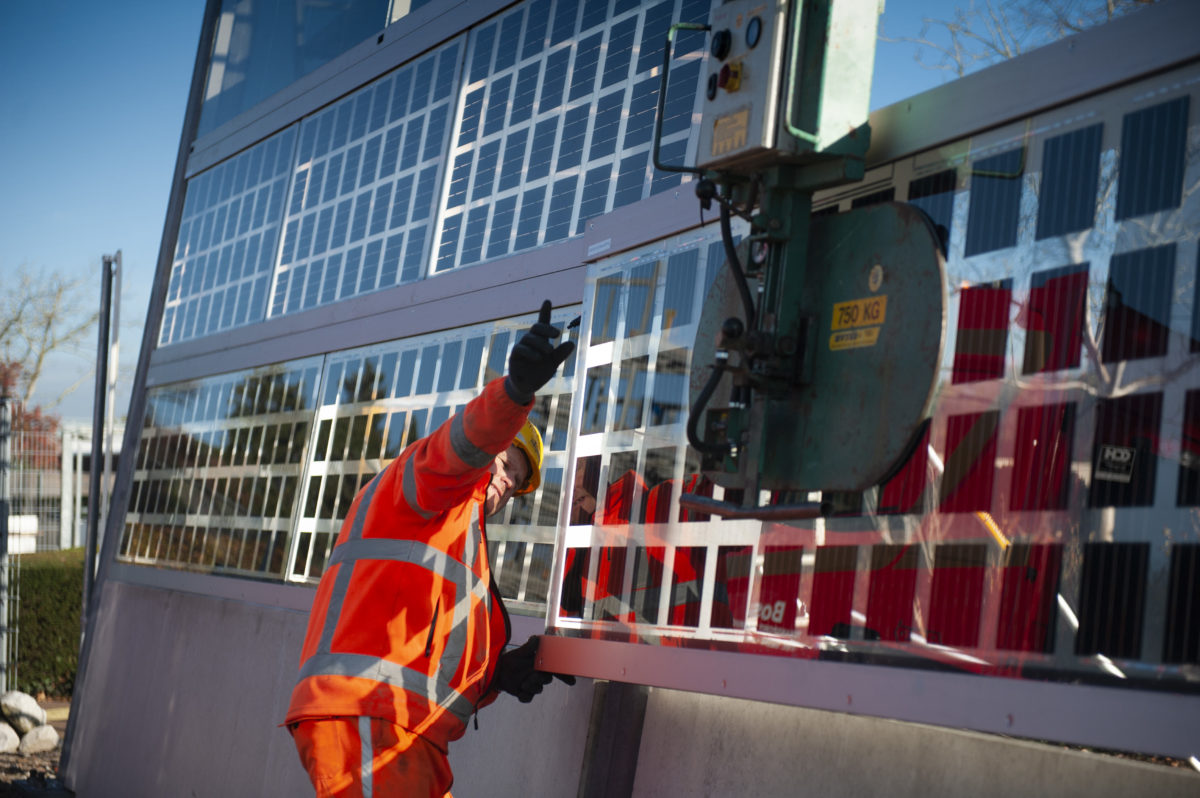Netherlands-based construction contractor Heijmans has deployed a pilot PV noise barrier at its own site in Rosmalen, in the Dutch province of North Brabant.
The project is part of a plan the company launched in 2017 to install solar noise barriers at several sites in the Netherlands, in cooperation with Belgian solar manufacturer Soltech, and Dutch cadmium telluride (CdTe) specialist Sanko Solar. Solliance also participated, along with the Netherlands Organisation for Applied Scientific Research.
The test noise barrier, which spans 400 meters in length, was equipped with 136 solar panels. Heijmans used three kinds of PV tech. Solliance provided thin-film bifacial CIGS cells, Soltech supplied bifacial crystalline solar cells, and Sanko Solar provided CdTe products.
The company was able to clearly define the challenges and opportunities related to the construction and operation of the project. In terms of bankability, the project has delivered lower performance than expected, for example. Heijmans has attributed this to the low rates at which the power is sold to the grid.
“One of our conclusions was that it is desirable to stimulate local consumption – for instance, by supplying a local energy cooperative or charging electric cars – in order to increase the economic revenue,” said Stijn Verkuilen, a business development specialist at Heijmans.
The company installed the solar panels on a concrete plinth extending about 1 meter above ground. “This is to prevent, for example, low-level PV modules from being damaged during mowing operations,” Verkuilen explained. “From a height of 1 meter, five cassettes have been placed in which PV modules are incorporated.”
Popular content
According to the company, the modular system applied in the project construction enabled a rapid deployment. “In case of possible defects, the so-called cassettes can be replaced easily,” Verkuilen said. Each PV cassette is 6 meters long and 1 meter high. “It can be constructed out of various parts, for example, two PV laminates of 3 meters by 1 meter, or three PV laminates of 2 meters by 1 meter that can be laminated between glass,” the company said, noting that different glass thicknesses can be chosen.
Verkuilen said solar noise barriers are currently unable to compete with conventional barriers on economic terms, but system efficiency improvements might be a way to reduce this gap. However, aesthetics are part of the added value of PV noise barriers, and that could give them an advantage over concrete barriers.
“‘We aim for the best possible cost-benefit ratio in euros per kilowatt peak and megawatt-hour,” Verkuilen concluded. “If the test results are favorable, we hope and expect to roll out PV integrated noise barriers more broadly in northwest Europe in the next decade.”
Prior to this project, Heijmans participated in a field study that demonstrated the use of solar noise barriers on roads and railways as an effective way to generate electricity. The Dutch national water management agency, the Rijkswaterstaat, plans to use the project to investigate the feasibility of more solar noise barrier projects.
The Dutch authorities are struggling to identify surfaces on which to deploy large-scale PV plants, due to the scarcity of usable land. In recent years, research institutes and private companies across the densely populated country have tried to prove the feasibility of solar projects on surfaces that do not damage agricultural land, including rooftops, road noise barriers, onshore and offshore water surfaces, and bike lanes.
This content is protected by copyright and may not be reused. If you want to cooperate with us and would like to reuse some of our content, please contact: editors@pv-magazine.com.



By submitting this form you agree to pv magazine using your data for the purposes of publishing your comment.
Your personal data will only be disclosed or otherwise transmitted to third parties for the purposes of spam filtering or if this is necessary for technical maintenance of the website. Any other transfer to third parties will not take place unless this is justified on the basis of applicable data protection regulations or if pv magazine is legally obliged to do so.
You may revoke this consent at any time with effect for the future, in which case your personal data will be deleted immediately. Otherwise, your data will be deleted if pv magazine has processed your request or the purpose of data storage is fulfilled.
Further information on data privacy can be found in our Data Protection Policy.